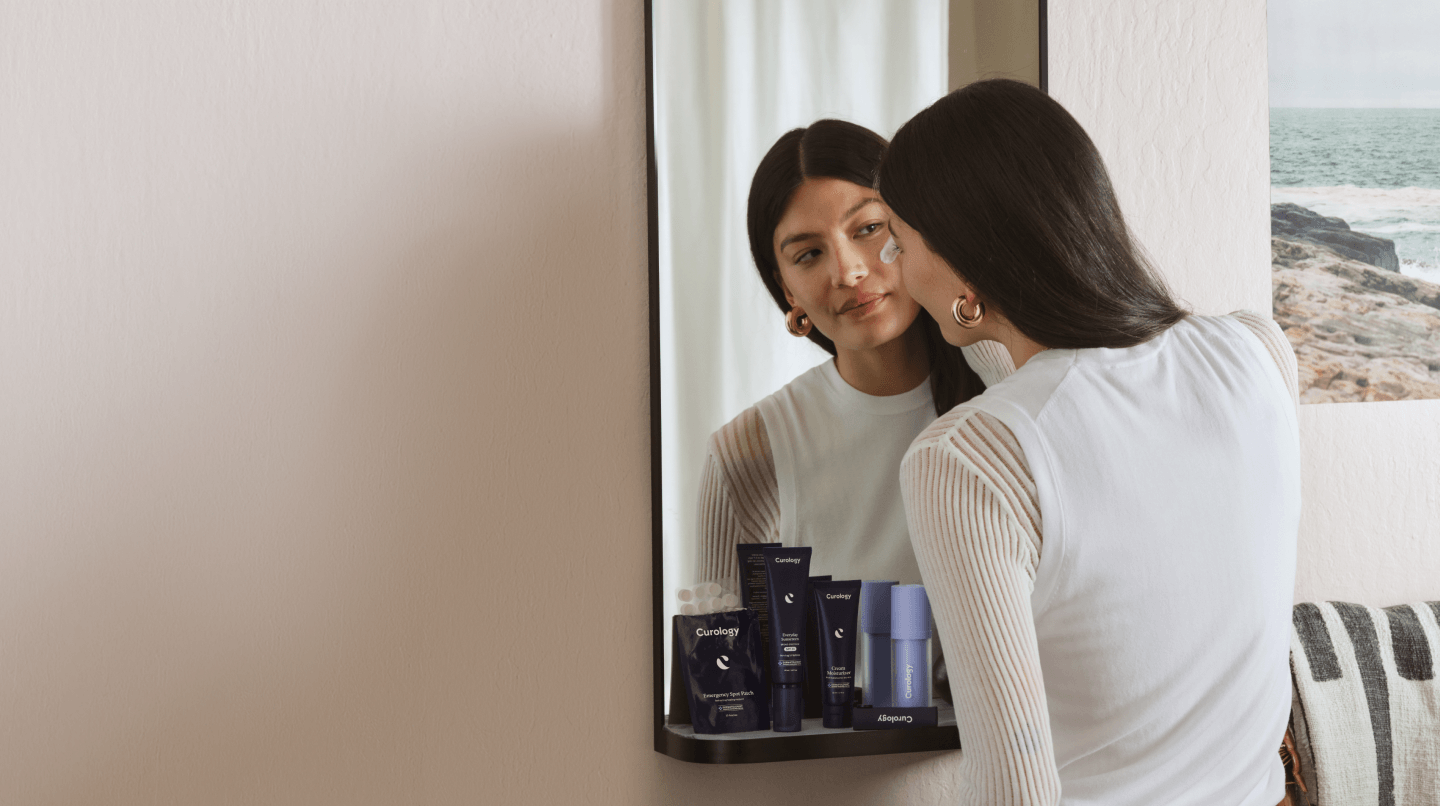How it works:
Share your skin goals and snap selfies
Your dermatology provider prescribes your formula
Apply nightly for happy, healthy skin
How it works:
How it works:
Share your skin goals and snap selfies
Your dermatology provider prescribes your formula
Apply nightly for happy, healthy skin
How it works:
4 tips on how to use retinol effectively
Everything you need to know about this skincare superstar, according to the pros.



Many think of retinol as the best of the best when it comes to skincare products—and for a good reason. It’s often labeled as a star ingredient for its ability to help minimize the signs of aging.
Understanding the way it works is one thing, but knowing exactly how to use retinol is another—especially because it can take time for your skin to adjust before you notice results. Here, we’ll tell you everything you need to know about retinol and share expert tips on how to use it in your skincare routine.
What is retinol?
One of the more popular over-the-counter skincare products on the market today, retinol, like all retinoids, is a vitamin A derivative, a key component in boosting skin cell turnover. It’s the OTC little sister to prescription retinoids like tretinoin (Retin-A) and tazarotene. Retinol’s claim to fame is that it helps reduce the signs of aging by boosting skin cell turnover, improving skin texture, and promoting collagen production.¹ Retinol works to improve the skin’s natural renewal process and strengthens its foundation.
Benefits of retinol
Retinol is a popular ingredient in creams and serums because it works to minimize the signs of aging. Its benefits include:
Improves fine lines and wrinkles. By helping increase the body’s collagen production, it works to reduce the appearance of fine lines and wrinkles.²
It Evens skin tone. Retinol stimulates skin cell turnover, removing dull and dry skin to reveal more even-toned (or what many refer to as “glowing”) skins.
Improves skin texture. Retinol’s exfoliating properties help soften patches of the rough skin to improve skin texture.
Improves firmness. It boosts collagen production to promote firmer skin.
Retinol products can be anti-aging powerhouses—and they’re very effective at doing that job. But how you use retinol for acne can be quite different. While retinol may help acne, there isn’t substantial evidence to claim that retinol treats acne. In most instances, you may need a prescription-strength retinoid like tretinoin.

What are retinol’s potential side effects?
It’s important to be mindful when adding this ingredient to your skincare routine because it can cause certain side effects, especially during the adjustment period. That’s why we recommend starting slowly (more on how to integrate retinol into your skincare routine in a bit).
Here are some potential side effects of retinol. These are temporary and should go away once your skin adjusts:³
Redness
Itchiness
Stinging
If any more severe side effects occur, stop using retinol. Once the side effects subside, you can try again using a smaller amount of retinol at a lower concentration.
Retinol is an OTC product, so you don’t need to consult a medical or dermatology provider before you begin using products containing it. But if you experience side effects that don’t disappear when you stop using retinol, or your skin doesn’t seem to adjust, seeking help from a licensed dermatologist or dermatology provider is advisable. Remember, everyone’s skin is unique, and what works for some people—retinol included—may not work for others.
Things to know when using retinol
While OTC retinol is not as strong as its prescription counterparts, it can still take some time for your skin to adjust. In fact, your skin may look worse as it gets used to this skincare ingredient, and it can take time to see results. Some people who use retinol may see improvements in the way their skin looks and feels within 8-12 weeks, although this can certainly vary.⁴
Here are some tips for how to use a retinol serum, cream, or lotion to see real results:
Start with a clean face. Retinol doesn’t replace your skincare routine—it adds to it. Apply it after washing your face. Use warm water and a gentle cleanser, and pat dry before applying retinol. Finish by applying a soothing or rich moisturizer.
Start slowly. Ease retinol into your skincare routine. Apply a pea-sized amount of low-strength retinol (0.01%-0.03%) to your face twice weekly. Gradually increase to three times a week, every other day, and then daily. Increase the strength as tolerated.
Be mindful of side effects. Watch for irritation and other potential side effects. If side effects persist beyond a few weeks or continue to get worse, back off your use.
How to use retinol at night. Retinol accelerates skin cell turnover, which can leave your skin more sensitive to the sun.⁵ Use a retinol at night and let it do its work while you sleep, and in the morning, cleanse, moisturize, and apply a broad-spectrum sunscreen with SPF 30 or higher.
We’re often asked if it’s better to use retinol before or after applying moisturizer. Typically, you’ll apply any topical treatment before your moisturizer, but that doesn’t mean you can’t apply moisturizer first to help minimize irritation from retinol.
When should I start using retinol?
We know that collagen levels decline as we age, and this leads to signs of aging such as fine lines and wrinkles. You don't need to wait until you start seeing these changes to start using collagen-boosting retinol, however. You can begin adding products that contain retinol to your skincare routine at any age.
Curology custom skincare

When it comes to treating your skin for concerns regarding acne or the signs of aging, Curology can help. We’re a full-service, dermatologist-designed skincare brand, and our mission is to help take the guesswork out of your skincare routine. Our licensed dermatology providers work with you to examine your skin, assess your skincare goals, and provide custom treatment options.
Our team uses proven ingredients, including prescription-strength retinoids like tretinoin, to defend against aging and acne. Getting started is easy. Just answer a few questions and snap some selfies to help us get to know your skin. If Curology is right for you, one of our licensed dermatology providers will work with you to create a personalized prescription formula for your unique skin.
Ready to get started? Just answer a few questions and snap some selfies to help us get to know your skin better. If Curology is suitable for you, we’ll pair you with one of our in-house licensed dermatology providers. The best part? You’ll get 25% off your first month by signing up today.*
FAQs
One of the more popular over-the-counter skincare products on the market today, retinol, like all retinoids, is a vitamin A derivative, a key component in boosting skin cell turnover. It’s the OTC little sister to prescription retinoids like tretinoin (Retin-A) and tazarotene.
Here are some potential side effects of retinol. These are temporary and should go away once your skin adjusts:
Redness
Itchiness
Stinging
We know that collagen levels decline as we age, and this leads to signs of aging such as fine lines and wrinkles. You don't need to wait until you start seeing these changes to start using collagen-boosting retinol, however. You can begin adding products that contain retinol to your skincare routine at any age.
P.S. We did the homework so you don’t have to:
Mukherjee S., et al. Retinoids in the treatment of skin aging: an overview of clinical efficacy and safety.Clin Interv Aging. (2006, December).
Kafi R., et al. Improvement of Naturally Aged Skin With Vitamin A (Retinol).Arch Dermatol. (2007, May).
Kafi R., et al. Improvement of Naturally Aged Skin With Vitamin A (Retinol). Ibid.
Ota, M., et al. 182 Retinol remarkably effective in reducing neck wrinkles.Journal of Investigative Dermatology. (2019, September 1).
American Academy of Dermatology. Retinoid or retinol?. Ibid.
Donna McIntyre is a board-certified nurse practitioner at Curology. She obtained her Master of Science in Nursing at MGH Institute of Health Professions in Boston, MA.
* Subject to consultation. Subscription is required. Results may vary.

Curology Team

Donna McIntyre, NP-BC
Related Articles
The science behind real glowing skin: how to shine without shimmer Ask an expert: What are the best skincare ingredients?Keep an eye out for these potential acne-causing ingredients Skin purging vs. breaking outIs my skin purging?Popular Articles
Ask Curology: Is my cold breaking me out?Slugging: The dermatologist-approved skincare hack going viral on TikTokTretinoin vs retinol: What’s the difference?How to create a self-care routine that actually sticksYour 2023 skincare horoscopeTry prescription skincare
Get routine essentials


Face what’s next with Future-ProofRx
Face what’s next with Future-ProofRx
- Skin texture
- Fine lines
- Wrinkles
- Dark spots
- Dullness
$29.95/month